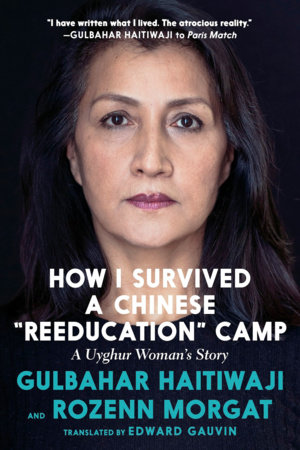

How I Survived a Chinese "Reeducation" Camp
By Gulbahar Haitiwaji and Rozenn Morgat
Translated by Edward Gauvin
By Gulbahar Haitiwaji and Rozenn Morgat
Translated by Edward Gauvin
By Gulbahar Haitiwaji and Rozenn Morgat
Translated by Edward Gauvin
By Gulbahar Haitiwaji and Rozenn Morgat
Translated by Edward Gauvin
By Gulbahar Haitiwaji and Rozenn Morgat
Translated by Edward Gauvin
By Gulbahar Haitiwaji and Rozenn Morgat
Translated by Edward Gauvin
Category: Biography & Memoir | Domestic Politics | World Politics | Asian World History
Category: Biography & Memoir | Domestic Politics | World Politics
Category: Biography & Memoir | Domestic Politics | World Politics

-
$19.95
Jul 30, 2024 | ISBN 9781644213889
-
$26.95
Feb 22, 2022 | ISBN 9781644211489
-
Feb 22, 2022 | ISBN 9781644211496
YOU MAY ALSO LIKE

Every Valley

To Free the Captives

The Road Years

The Chronicles of DOOM

The Picture Not Taken

Perdita

Sinéad O’Connor: The Last Interview

Mondrian

Donald Writes No More
Praise
“The book is most valuable as testimony. For Uyghurs, Haitiwaji explains, the camps are “a kind of urban legend,” made mythic by silence: “If no one talks about them, then the camps aren’t real.” Her memoir, dedicated “to all those who didn’t make it out,” contributes to a rich and painful body of memory-keeping that grows all the time.”
—Jamie Fisher, The New York Times
“[A] powerful, heart-wrenching memoir.”
—Elizabeth M. Lynch, Commonweal
“A viscerally affecting memoir from a Uyghur woman who “endured hundreds of hours of interrogation, torture, malnutrition, police violence, and brainwashing. . . . A taut, moving, powerful account of an ongoing human rights disaster.”
—Kirkus Reviews (starred review)
“After being imprisoned for nearly three years, Haitiwaji, a member of the Uighur community, details in this rousing and courageous debut the brutal treatment she survived in one of China’s “reeducation” camps. Structured like a diary, her narrative begins in August 2016 at her daughter’s wedding in Paris, a celebration that’s tinged with sadness because those in attendance are living in exile, having left China after a crackdown against a growing movement for Uighur autonomy. A few months later, Haitiwaji was summoned to China, ostensibly to resolve a pension matter, and detained by government authorities. With her daughter accused of terrorism (she was seen holding a flag representing Uighur independence at a Paris protest), Haitiwaji was imprisoned, shackled to her bed for 20 days, and relentlessly interrogated. Her story grows more disturbing when she recalls the repeated violence and 11 hours of daily “education” she received over the next two years once she was sent to “school”: “this was brainwashing, whole days spent repeating the same idiot phrases.” Haitiwaji’s forthright descriptions of her harrowing experience at a modern-day concentration camp—before she was released in 2019 with the help of her daughter—offers a sobering look at the horrific ways genocide is still being enacted today. This urgent testimony will serve as a wake-up call to Western readers.”
—Publishers Weekly
“Of this urgent first memoir about the ‘reeducation’ camps by a Uyghur woman, the author confirms: ‘I have written what I lived. The atrocious reality.'”
—Ms.
“A current and deeply disturbing personal account of being targeted as a Muslim Uyghur . . . This memoir puts a much-needed face on abstract world news about the upwards of one million men and women estimated to have been taken from their families and jobs, imprisoned in camps, and ‘reeducated’ in western China. . . . Gulbahar’s is a brave and important voice; her choice to lay her name and face bare to speak as loudly as possible calls us, in turn, to witness, to amplify, to not look away.”
—World Literature Today
“Gulbahar’s story is a truly powerful representation of resilience. As the Chinese Communist regime is actively seeking to undermine the values of freedom and democracy across the globe, we need only read testimonies like this one to know what the future world order will look like if the Chinese Communist regime is allowed to continue unchecked. Despite her suffering, her courage in the face of genocide shines through. May every person who reads it be inspired to confront these modern-day horrors and be an upstander just as Gulbahar has been.”
—Rushan Abbas, Executive Director, Campaign For Uyghurs
“Gulbahar Haitiwaji’s beautifully written account of brutality in the Chinese government’s “reeducation camps” is a remarkable feat—accessible to all readers, deeply human despite the inhumanity detailed, and unsparing in its details of bleak efforts to destroy Uyghur identity. One constant throughout the book, and clearly throughout her life: Haitiwaji’s extraordinary courage.”
—Sophie Richardson, China Director, Human Rights Watch.
21 Books You’ve Been Meaning to Read
Just for joining you’ll get personalized recommendations on your dashboard daily and features only for members.
Find Out More Join Now Sign In











